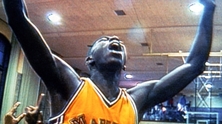Is It Really a Great Movie? Part Thirty-Seven: Hoop Dreams
by dan heaton
Using Roger Ebert's Great Movies book as a guide, this series of articles will focus on all films included on his list that previously have escaped my notice. Since all lists are subjective, I am not treating Ebert's choices as the essential selection of films. However, his essays offer the perfect chance for me to explore both classics and lesser-known pictures from around the globe.

Documentaries rarely cross over and enjoy multiplex success, and the likelihood was even rarer in 1994. Spurred by tremendous acclaim from critics like Gene Siskel and Roger Ebert, Hoop Dreams earned nearly eight million dollars at the box office. Directors Steve James, Frederick Marx and Peter Gilbert shot footage for seven years to compose the 170-minute story of two basketball hopefuls. The gripping film earned tremendous acclaim, including the Audience Award for Best Documentary at Sundance and a Best Editing nomination from the Academy. However, it did not receive a nomination for a Best Documentary Oscar. This omission was loudly derided by critics and led to changes in the selection process. Nearly 15 years after its original release, this groundbreaking documentary is still considered one of the best of its kind.
This story focuses on the lives of William Gates and Arthur Agee — young Chicago basketball players with dreams of reaching the highest level. It chronicles their entire high school careers and ventures briefly into their college future. Each guy takes a much different path, but they both start at the prestigious St. Joseph’s High School, a private school that recruits inner-city basketball players. William achieves stardom, but a crippling knee injury raises doubts about his future prospects. Arthur’s family runs into financial trouble, which causes him to leave St. Joseph’s for a city public school. He also struggles to reach his basketball potential and faces a rough home life. Both of them face challenges off the court that are much greater than any physical opponent. The classroom is no picnic, and steady ACT scores are the key to reaching a prominent college. The stakes go well beyond attaining personal glory, which lends tremendous weight to every shot taken on the basketball court.
Hoop Dreams is fascinating because it depicts so much more than the on-court events of high school basketball. The issues around reaching one’s potential and securing a bright future are universal and can apply to any background or major goal. Many of the best moments involve the families, who support their kids while making their own mistakes. Arthur’s father struggles with drug addiction, and his mom keeps them afloat with only minute government welfare support. There’s also the larger subject of the high school basketball culture and its recruiting practices going back to middle school. The St. Joseph’s coach means well, but his primary concern is winning the state title, not serving his players long-term interests. It’s also disheartening knowing that very few young men with basketball talent will actually reach the NBA. The pressure to succeed from coaches, parents, siblings and others to reach this goal can be too much for many to face. Arthur and William are both good kids, which makes their achievements and setbacks so engaging. After three hours, we’re emotionally invested in the story and want to see them do well. The running time may be long, but the story rarely drags and includes numerous spellbinding moments.
Roger Ebert named Hoop Dreams the best film of the 1990s, which might be a stretch, but I can’t argue with his high praise. By spending such a long time with Arthur and William, the filmmakers are able to present a clear picture of their environments. Nothing feels rushed or forced, and there are no “talking heads” obviously describing the pivotal issues of basketball hopefuls. Instead, we’re allowed to draw our own conclusions and simply enjoy the experience of following two compelling young men. I can resoundingly say that Hoop Dreams is a Great Movie and deserves to be seen by any viewer attracted to a good story. Interest in basketball is not a pre-requisite, and the real-life events go well past typical sports movie territory.
Check out the entire series of "Is It Really a Great Movie?" articles here.
Copyright (c) 2007 erasing clouds |
|